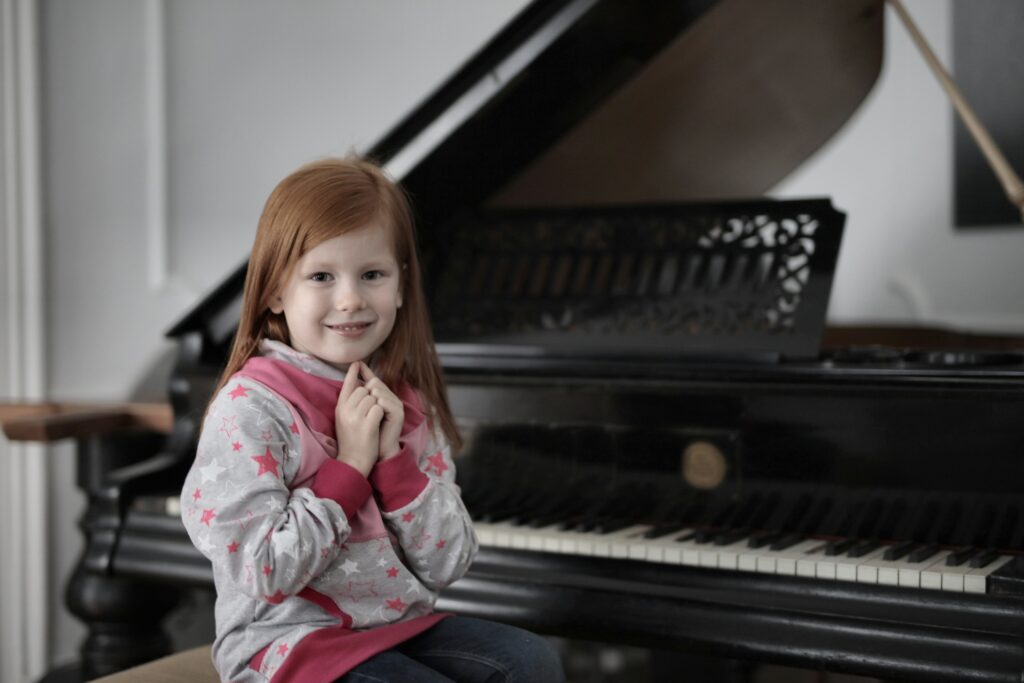When should a child start piano lessons?
If your child shows musical interest such as singing, banging rhythmically as if using a drum set, or makes interesting musical patterns with their toys, it might be a good idea to start musical training early, around three or four-years-old (not with piano lessons but by letting them practice at home with your help on a fun smaller version of the instrument).
There isn’t a perfect age to start piano lessons necessarily, as it depends on the individual and, of course, their interests. Even an adult can start learning piano and make good progress – often better, in fact, as adults generally understand better than children what their teachers tell them, and often have better practice habits than children.
The earliest age to start actual lessons, assuming your child already has exposure to the instrument is around five or six-years-old. If your child has NOT been exposed to the instrument, you want them to start sometime between six and eight-years-old.
Beginning piano lessons when a child is in second grade, or about eight-years-old, is a good age to start in order to give your child enough time to learn, improve and to reach the piano levels that RCM (Royal Conservatory of Music) requires for your child to get some secondary and post-secondary benefits out of this in their school. You can always start later however! Better late than never right?
Your child’s first piano
You will need an instrument to practice on, and while the small keyboards are great for those that want to dabble in music, they do not feel like a real piano, and most of them have smaller keys than a regular piano. It is recommended to instead buy or rent a piano or full size keyboard (whatever fits your budget and interests better) either prior to or shortly after starting piano lessons. Follow this link to my post about how to choose a piano that is right for you or your child. (Spoiler: Digital pianos are the best choice in most situations especially if you or your child are using them to learn music.)
Getting your (young) child started
One way to get younger kids – three to six-year-olds – started with piano lessons is to purchase an inexpensive keyboard with plenty of fun features, sounds and built-in songs or pieces that the keyboard can play on its own. To see a list of the best keyboards for young kids, click here.
Quite often, parents have fun taking part in their child’s learning process by figuring out how to play a favourite tune or melody and then teaching it to their child, then having their child figure out how to play a song on their own. This way a child can become acquainted with a keyboard; the way the notes are arranged on it (even if they don’t know the names of the notes); they’ll quickly learn the concept that high-pitched notes are to the right and lower-pitched notes to the left. They’ll start understanding rhythm without realizing it.
Doing all this will let you see if your children are enjoying the instrument or music in general, but also will show you if they have any innate talent and if you think they are prepared for lessons to advance farther. As a bonus it is a great way to spend time with your child and bond a little as both of you experiment with a new instrument!
How long should your child’s first piano lessons be?
Each student is different, but generally you’d be looking at lessons of a maximum length of 30-45 minutes, as many kids struggle keeping in one place for very long, especially after school. Don’t expect your toddler to sit through a practice lesson without getting constantly distracted!
Often, music teachers, especially those that come to your home, charge a higher rate if a lesson ends up less than one hour long. Because of this, families with two or more kids try to get all their kids to sign up; a longer lesson time means you pay less per hour, and at the same time all your kids learn — more bang for your buck!
While it is a good thing if all your children are ready and interested in learning an instrument, in the cases where children can’t or don’t want to learn, you might be spending money just to entertain them for 15 or 30 minutes when instead you could be spending that same amount to improve the lesson quality for your interested child (or an interested sibling).
Kids aged 3-5 usually don’t need real piano lessons, and can even be taught by their older sibling as they go along in their studies – in fact the older sibling will retain the material better if they have to then teach it to someone else as they will solidify their knowledge of what they know and realize what they don’t yet understand thus greatly contributing to their learning process in a similar manner as practicing does. Of course there are exceptions, but your child doesn’t need to be an exception in order to become an exceptionally good pianist or musician later in their life.
Do you have some input from personal experience or need some more advice? Leave a comment below!

